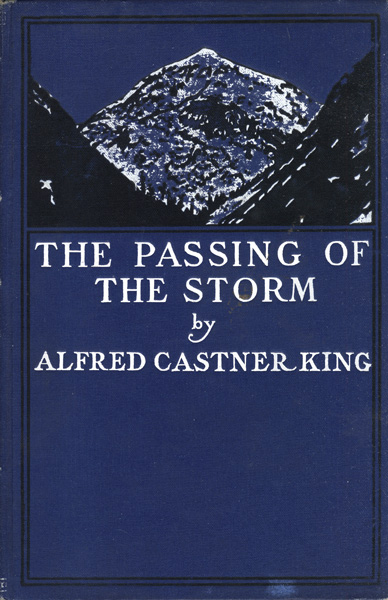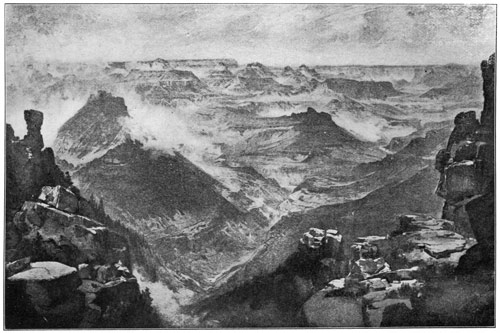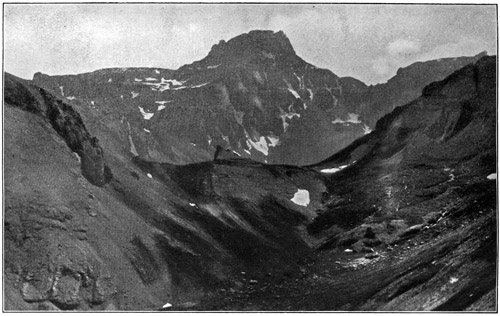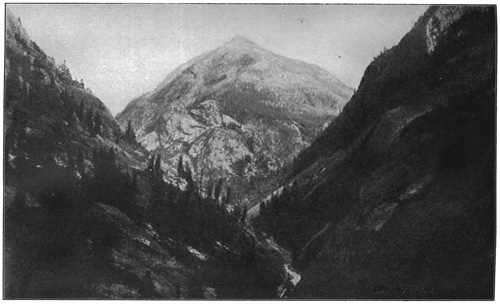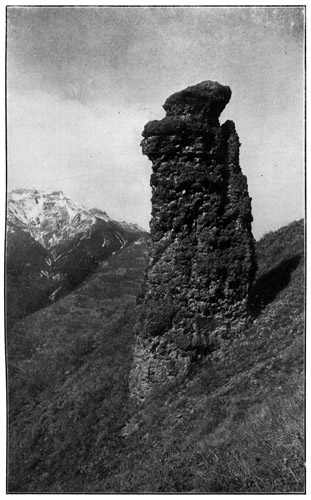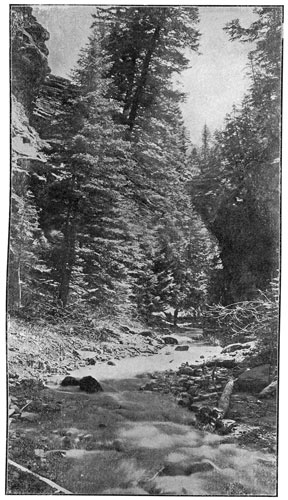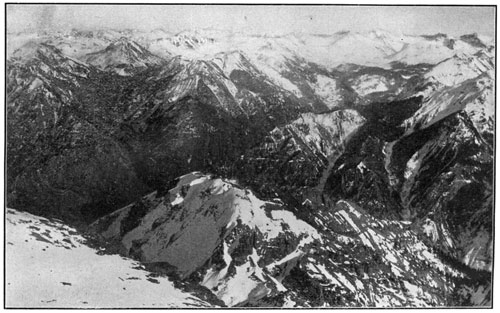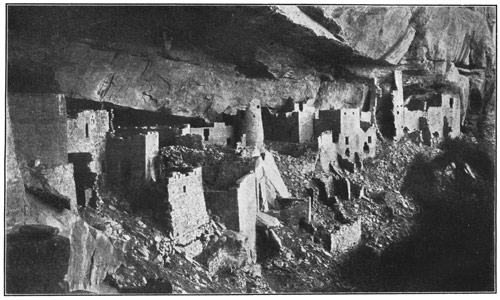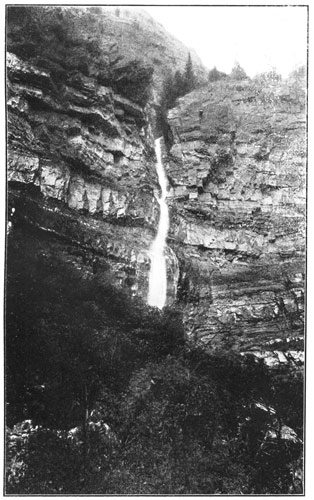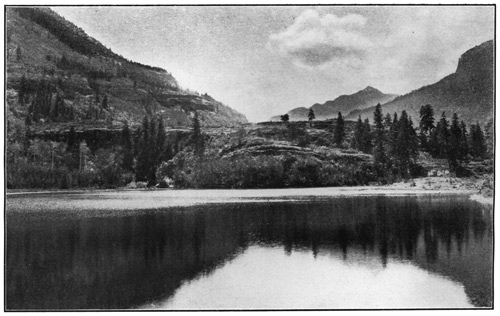All eyes now sought the brother of McGuire,
Who sat apart, some distance from the fire
Smoking in silence, while the flickering light
Mingled its crimson with his locks of white;
He, with his flowing, patriarchal beard,
A sage, from some forgotten age, appeared,
Or wrinkled seer from some enchanted clime,
Whose eye could pierce the veil of future time.
There in the ever thickening haze of smoke,
He, being three times importuned,—awoke.
As from his corncob pipe and nostrils broke
The spiral wreaths of blue tobacco smoke,
Which formed a smoky halo, as they spread
A foot above his venerable head,
Resembling halos which the artist paints
O'er angel heads, or mediæval saints,
This man of years, so calm and circumspect,
Stroked his long beard, yawned twice and stood erect.
Like to a wizard, or magician old,
With some mysterious secret to unfold,
This man, whose bearing would command respect,
Stepped forth and eyed his listeners direct;
Then waiving preludes or apologies,
Addressed his auditors in terms like these:
73"These lips, which now their secret shall reveal,
For more than forty years have worn a seal.
For years as hunter, pioneer and scout,
I roamed the western solitudes about,
Not caring whether fortune smiled or not,
If memory's painful twinges were forgot.
I sought, as many other men have done,
Within the wilderness,—oblivion.
Work is the only sure iconoclast
For the unpleasant memories of the past;
So as a placer miner, prospector,
And half a dozen avocations more,
Within the city, and the solitude,
The star-eyed Goddess of Success I wooed.
Twice was I numbered with the men of wealth,
Twice lost I all, including strength and health.
For wealth, when fortune's fickle wheel revolves
Adversely, into empty air dissolves.
Till fate so strangely led my footsteps here,
Mine was, indeed, a versatile career.
Yet none my antecedents ever guessed,
Nor learned from me the cause that led me west.
This hair and beard which envy not to-night
The drifting snowbanks their unbroken white,
Methinks, as memory scans the backward track,
Vied with the raven's glossy coat of black,
When I, with some adventurous emigrants,
First crossed the plain's monotonous expanse,
74To leave my former history behind.
But who can regulate his peace of mind,
Or drop the morbid burdens of the breast
By simply going east or coming west?
'Way down upon the Rappahannock's shore,
Enshrined in memory, though seen no more,
There lies an old plantation. There I drew
My infant breath, and into manhood grew.
Its fields are overgrown with willows now,
For more than forty years unturned by plough,
While war's red desolation razed to earth
The old stone manor-house that claimed my birth.
Ah, yes! 'Tis forty years ago, or more,
Since, standing near the old paternal door,
One pleasant morning in the early spring,
With some few friends and kinfolks visiting,
Two mounted neighbors stopped in passing by,
And reining up their horses hurriedly
Told us the news, which like a cannon ball
Sped through the land, announcing Sumter's fall.
The animus with which their comments fell,
I heard months later in the rebel yell.
In civil war or fratricide is found
No place for such as seek a middle ground.
Though lines of demarcation intervene,
No peaceful neutral zone may lie between.
'Tis not an easy thing to breast the tide
Of public sentiment, and to decide
75In opposition, though the cause be right,
When crossing public sentiment means fight.
'Tis easier to let the moving throng
Without resistance carry you along.
When he who hesitates, or turns around,
May in the grist of public wrath be ground.
But men there are you cannot drive in flocks;
They dash like breakers, or resist like rocks.
Within my breast I fought my sternest fight,
I could not view the southern cause as right,
And yet I loved the people of the south;
Debating thus I opened not my mouth.
Both in my waking hours and in my dreams,
I heard the arguments of two extremes.
My conscience said: 'A uniform of blue
Awaits your coming, wear it and be true.'
My interests argued: 'Though the cause be wrong,
Your people have espoused it right along.
Your worthy family has for many years
Seen sorrow only in the white man's tears.
Desertion means to wear the traitor's brands,
And face your friends with muskets in their hands,
To slay them with the bayonet and ball,
Or by, perhaps, your brother's hand to fall.'
I heard the clarion accents of the fife
Fan into flames the dormant coals of strife.
With blast prophetic and reverberant swell,
I heard the bugle's echoing voice foretell
76The coming conflict, while the brazen notes
Were answered by the cheers from many throats.
I heard the measured rattle of the drum,
Proclaiming that the day of wrath had come.
I heard harangues, incendiary and loud,
Meet with the approbation of the crowd.
I saw the faltering and irresolute,
Greeted with jeer and deprecating hoot.
I saw the threatening clouds of war increase,
Yet prayed for peace, where there could be no peace.
The winds of slavery their seed had sown;
That seed to rank maturity had grown;
The cup was full, and now from branch and root,
The whirlwind came to strip its lawful fruit.
I saw my friends and neighbors march away
With martial tread, in uniforms of gray.
I saw them raise their caps in passing by
And fair hands wave their kerchiefs in reply.
Then I, who had in military schools
Received some insight into army rules,
And, being of a martial turn of mind,
Was offered a commission, and,—declined.
My declination was a shock to all,
'Coward!' said they, 'to shun your country's call,—
Then stay at home, from wounds and scars exempt,
But pay the price,—your former friends' contempt.'
That action was, for me, the Rubicon,
Which crossed, I had no choice but follow on.
77But what a change! The penalty was high,
My childhood's friends now passed me coldly by.
I, who had been a social favorite,
Received no salutation when we met.
Fair ones, who used to smile, now looked askance,
Or eyed me with a cold indifference.
My action seemed base cowardice in their eyes,
They knowing not my secret sympathies.
Though of a family rich and widely known,
I stood in the community, alone,
Like a pariah none would recognize,
Inaction was enough to ostracize.
I seemed to see, like Hagar's fated son,
Against me raised the hand of every one.
The time had come when I must make my choice,
Defend one side with musket and with voice;
Then I, to conscience and convictions true,
Seemed an apostate,—for I chose the blue.
There are inscriptions on the scrolls of fate
Which seem too bitter even to relate.
I waive the details,—better to conceal
The secret skeletons, than to reveal.
I shall not tell you how my brother stormed,
When he of my intentions was informed.
I pass the story, how my ringing ears
Were filled with threats, entreaties and with sneers.
And how with tear-stained face the maiden came,
Who was to be my bride and bear my name;
78How she appealed to sentiment and pride,
Plead, supplicated,—then forsook my side;
And how one evening, in an angry burst,
My sire pronounced his favorite son accurst;
And how a mother, clinging to her child,
Saw son and father still unreconciled;
And how that father, pointing to the door,
Forbade that son to cross the threshold more;
'Go, go!' said he, 'but never more return!
Go, slay your neighbors, pillage, sack and burn!
But never while the golden sun doth shine,
Be welcomed home as son and heir of mine.'
I state not what in anger I replied,
For anger in my breast has long since died.
Renounced, despised and disinherited,
I trod the path of duty where it led,
And ten days later, in the rain and damp,
Stood as a sentry near a Union camp.
Fain from my recollections would I blot
These images, which time erases not,
And leave to history's undying page,
The recitation of those acts of rage.
Incarnadined with human blood appears
The record of the four succeeding years.
Black with the ruins of the vandal flame,
A carnival of misery and shame.
I must abridge, and if my hearers please,
Confine myself to generalities.
79
From first Manassas to the Wilderness,
A period of some four years,—more or less,
But anyway, till long in sixty-four,
A musket or a shoulder-strap I bore.
Though years have passed, I have remembrance yet
Of musketry and glistening bayonet.
As retrospective moods attune the ear
To memory's voice, again I seem to hear
The cannon's deep and minatory roar,
Like breakers dashing on a rock-bound shore.
The bursting bomb and fulminating shell,
Again their stories of destruction tell.
Again to-night, with memory's eye I view
The sanguinary scenes of sixty-two,
The march of infantry, the reckless dash
Of cavalry, with onslaught fierce and rash;
I see their sabres, glittering and bare,
Flash from their scabbards in the smoky air;
I hear the clatter of the horses' hoofs,
And see the smoke expand in greyish puffs;
As rifles flash and speed the deadly ball,
I see the riders from their horses fall;
Yet forward moves the furious attack,
The opposing column wavers and falls back;
I see the impact, combat hand to hand,
Horses and riders writhing on the sand;
I see the steeds with perspiration wet,
Sink on the well-directed bayonet;
80I see them, wounded by the fatal lunge,
Become unmanageable and madly plunge;
Foaming and snorting with the sudden pain,
They trample on the wounded and the slain;
I see their riders in the stirrups stand
And grasp their pistols with the bridle hand;
I see the pistols flash and sabres thrust,
A scene of wild confusion, smoke and dust;
I hear the bugle sounding a retreat,
They now retire, their victory complete;
But mark the price paid for their brief success;
Horses with blood-stained saddles,—riderless.
I see an army bivouac on the field,
To nature's obdurate demands they yield,
And on the ground, from sheer exhaustion spent,
They lie without protecting roof or tent.
So silently their prostrate forms are spread,
One may not tell the sleeping from the dead.
I see, before the campfire's fitful gleam,
The sentry pace, as in a waking dream,
Yet manfully subduing the fatigue
Of battle, and the march of many a league,
For no excitement or emotion serves
To buoy his spirits or sustain his nerves.
Weak from the loss of their accustomed rest,
With heavy eyes and aching bones distressed,
The while their weary comrades soundly sleep,
The sentinels their lonely vigils keep,
81As from the glittering expanse of skies,
The stars look down with cold, impassive eyes.
I see brigades, magnificent and large,
With bristling bayonets prepare to charge;
I see their banners in the distance gleam,
Reflecting back the sun's resplendent beam;
Within the shelter of the rifle pits,
Another army with composure sits,
While ever and anon a rifle's crack
Seems to invite the spirited attack.
From a commanding, wooded eminence,
By nature calculated for defence,
Upon the advancing regiments I see
The murderous belching of artillery;
I see their proud and militant array,
Before the deadly grapeshot melt away;
Before the rifle's supplementing breath,
Whole columns sink in ghastly heaps of death;
I see them close their gaps and press ahead,
But only to augment the list of dead;
I see them, stretched upon the burning sands,
Clutching the air with lacerated hands;
From underneath the mutilated heap,
The wounded, with great difficulty, creep;
Dragging a helpless arm, or shattered limb,
With reeling brain and sight confused and dim,
They grope, they crawl, or limp with painful tread;
Their uniforms no longer blue, but red;
82And pinioned underneath the ghastly pile,
I hear them struggle for release the while;
But fainter, ever fainter grow their cries,
Fainter, and fainter still, their groans arise;
Weaker and weaker are their throes, until
With one last quivering throb, they too, are still.
I see the vultures, as they scent afar
Their portion in the reeking spoils of war;
Far in the distance scattering specks appear,
Which multiply in size as they draw near,
Until they balance with their pinions spread,
Or circle 'round the dying and the dead.
This is the realistic side of war,
Which most men overlook and all abhor,
Which differs from the sentiments conveyed
By spotless uniforms on dress parade.
War is a crucible that tries men's souls,
A drama, stern in all its various rôles;
Though saturated with all forms of crime,
'Tis celebrated in heroic rhyme;
Though opposite to every humane thought,
With murder, pillage and destruction fraught,
In literature, in history and art,
It forms the theme, or plays a leading part;
Though at the best, deplorable and bad,
'Tis yet with sentiment and romance clad;
Thus are the gory deeds of sword and fire,
Commemorated by the bardic lyre.
83
Its eras, though with tragedy replete,
Form stepping-stones whereon ambitious feet
May mount to prominence, perhaps to fame,
And write in crimson an illustrious name.
'Tis said that heroes are the fruits of war,
No matter what the struggle may be for,
As men will fight to make, or unmake laws,
Will fight for, or against the worthiest cause.
They must have heroes, though to make them drains
The life-blood from the nation's noblest veins.
And though no vocal adulations rise,
Their heroes many men apotheosize.
Man is so strangely constituted, he
Must hero-worshipper, or hero be,—
So give him heroes, let the armies bleed,
And he will worship them with word and deed;
Though down within their breasts most men prefer
To be the hero, than the worshipper.
To gain the plaudits of the multitude,
The warrior, with ambitious zeal imbued,
Climbs upward, and accomplishing his ends
To take his share of worship condescends,
Forgetting that his honors are bedewed
With human tears and based on human blood.
Some streaks, in military pomp, we see,
That savor much of pride and vanity,
As thirst for notoriety and fame
Has often fanned the patriotic flame.
84Though one might think that men would be content
To pluck one star from glory's firmament,
Yet, when they mount the ladder a few rounds,
Their envy and ambition know no bounds.
To wear the epaulette and strut with pride,
Makes men forget that war is homicide.
Some call it fate, some call it destiny,
Some call it accident; what'er it be,
It seems that some have been created for
The honors, some, the sacrifice of war.
When I enlisted as a raw recruit,
Promotion was no object of pursuit,
But liking honor more than sacrifice,
On shoulder-straps I soon cast envious eyes.
For one rash act,—'twas counted bravery,
Good fortune made a corporal of me.
Soon, as if favored by some lucky charm,
I wore a sergeant's stripes upon my arm.
Twice was I wounded, twice resumed the field
Before my wounds had been completely healed.
I carry yet, and shall until I die,
A musket ball, encysted in my thigh.
Twice was I captured, twice as prisoner
Drank I the dregs from out the cup of war.
As if some guardian star my course arranged,
Once I escaped, and once was I exchanged.
Then, as lieutenant, rose I from the ranks,
Received a medal and a vote of thanks.
85
The ladder of promotion, round by round,
I soon ascended and henceforth was found
Among the few selected favorites
Whom fortune decks with stars and epaulettes.
Though liking not the rôle of matador,
Within the ruthless theatre of war,
From private soldier every part I played,
Until my sword directed a brigade.
I wore, the night before I started west,
Four medal decorations on my breast.
The war progressed, for time rolls on the same
In peace or war, and sixty-three became
A chapter in the annals of the past.
When sixty-four was ushered in at last,
To write in characters of blood and fire
Its page of human immolation, dire,
The waiting army lay encamped, before
The Rapidan's inhospitable shore.
The first few weeks, devoid of incident,
Were in the army's winter quarters spent,
Until the winter, on his snowy wing,
Retired before the genial breath of spring.
In speculation on the moves to come,
The tongue of prophecy remained not dumb,
But showered prognostications of defeat,
Succeeded by the usual retreat,
When rumors of offensive action planned
As spring approached, were spread through each command.
86Until the troops were mobilized and massed,
Until the final orders had been passed,
The veterans, who had remembrance still,
Recounted Fredericksburg and Chancellorsville.
But soon the dreadful Wilderness campaign,
With its long lists of wounded and of slain,
Vied with the carnage of the year before,
If it be possible to measure gore.
The tactics had been changed, for no retreat
Was ordered, as the sequel of defeat;
Instead of faltering or turning back,
There came another furious attack,
Another movement with invasive tread,
And, Spottsylvania claimed its heaps of dead.
Defeated, but uncrushed and undismayed,
The weakened corps, including my brigade,
With sadly thinned and decimated ranks,
Was hurled once more against the rebel flanks.
There in a hurricane of shot and shell,
One-half of its surviving numbers fell;
'Twas thus Cold Harbor's quarry made complete
The trio of victorious defeat.
Three Southern victories, yet like a knell
Upon the Southern ear these triumphs fell;
For those who perished in that dismal waste,
Had fallen and could never be replaced.
Though stubbornly contested inch by inch,
The lines were tightened like a horse's cinch.
87We watched the Southern forces day by day,
From natural abrasion, wear away.
One evening as the disappearing light,
Unveiled the beauties of a cloudless night,
With much diminished numbers, my brigade
Its camp beside the Rappahannock made,
Some five miles distant from the spot of earth
Associated with my humble birth.
Next morning, ere the twinkling stars had set,
While officers and men were sleeping yet,
A courier rode up to my command,
And placed a cipher message in my hand;
Then spurring well his horse of dapple grey,
With parting salutation rode away.
This was the import of that message stern:
'Lay waste the district. All the fences burn.
Leave not a house or stable unconsumed.'
My father's house among the rest was—doomed.
I read that message and my anger blazed,
My home to be, by my own orders, razed!
A vision rose before my swimming brain,
I saw the old parental roof again,
I saw my father, as in days of yore,
Smoking his pipe beside the open door;
I saw his gaze, with penetrating look,
Fixed on the pages of some wholesome book;
88I saw my mother sit beside him, there,
Recumbent in her old reclining chair.
The vision changed,—I saw her parting tears,
My father's parting curse rang in my ears;
'Go! Go!' said he, 'but nevermore return,
Go, slay your neighbors, pillage, sack and burn,
But never while the golden sun doth shine
Be welcomed home as son and heir of mine.'
I felt but little longing to return,
And less desire to pillage, sack and burn.
And yet,—those cruel orders I must give,
No power had I to voice the negative.
In commonplace affairs of life, 'tis true,
Men may elect to do, or not to do.
In military operations, they
Have no alternative, but to obey.
Ah! Fain, from that impending holocaust
Would I have snatched them! Rather had I lost
The tinselled honors and the epaulettes,
And doffed my uniform without regrets,
Than harm by word or deed that agèd sire;
Yet I must start, who fain would quench the fire.
I read and read that cipher message there,
How many times, I have not to declare,
But over and again I scanned the lines,
And pondered well its symbols and its signs;
Ironclad were they, from every standpoint viewed,
Admitting not of choice or latitude;
89So, to the officers of my command,
I gave their orders, with a trembling hand,
And swift as horseflesh ever travelled, went
To seek the corps commander in his tent,
To crave this boon, or favor, at his hand,—
My father's house be still allowed to stand.
'Twas long before I gained an audience;
I felt, but cannot picture the suspense
Of that long hour's involuntary wait;
Too late, my heart would beat, too late, too late!
I took a seat and pulled my watch out once;
'Too late, too late,' the timepiece ticked response!
I paced the ground with quick, impatient tread;
'Too late, too late, too late,' my footsteps said!
'Too late, too late, too late!' With fluttering beat
My heart responded to my echoing feet.
The General, who a kindly heart possessed,
No sooner heard, than granted my request;
'Twas but a moment's work to mount my steed,
And spur him to his maximum of speed;
The faithful creature seemed to understand
And needed little urging from my hand,
As down the turnpike, toward my childhood's home,
He fairly flew, his bridle white with foam;
His hoofbeats, as we clattered o'er the ground,
Returned a dull, premonitory sound,
Which seemed to echo and accentuate
The burden of my heart, 'Too late! Too late!'
90
The fences, near the turnpike, as we passed,
Were by my orders disappearing fast;
The rails were piled in heaps and soon became
A prey to war's red ally,—vandal flame.
Houses, familiar to my childish sight,
Glowed strangely with an unaccustomed light,
While from adjacent barns and hay-ricks broke
Incipient tongues of flame and clouds of smoke.
The orders, ruthless and inflexible,
Were by the soldiers executed well.
Still down the turnpike dashed my sweating horse,
I plied the cruel spurs with double force,
When in the distance there appeared to view
The old stone manor-house my childhood knew.
My spirit sank,—though I was not surprised,
My worst misgivings had been realized,
For from the roof and upper windows came
Dense clouds of smoke and lurid sheets of flame.
It had its portion in the common fate,
'Too late!' the mocking hoof-beats rang, 'Too late!'
We passed a company, on their return
From executing those instructions stern;
It was the company of my brigade
Wherein I first was a lieutenant made;
Its officers and men I knew by name;
They cheered me when their captain I became;
They cheered me when I left a major's tent,
To be the colonel of their regiment.
91
They did my bidding. How could I condemn!
They honored me and I respected them;
And yet, these favorites of my command
Had not one hour before applied the brand
Which was transforming with its wand of fire
My father's house into—his funeral pyre.
That they had met resistance, I could see,
For wounded men, in number two or three,
Were by their comrades carted in advance,
While one more limped behind the ambulance.
Upon a stretcher carried in their van,
The soldiers bore the body of a man;
He was their captain, and my bosom friend;
He plied that torch,—and met a bloody end.
I plunged the spurs, but not without remorse,
Into his steaming flanks and urged my horse,
Which I disliked to tax beyond his strength;
Such speed had he maintained, that now, at length,
He was compelled to pant and hesitate;
With labored effort we dashed through the gate,
Or where the gate had been an hour before,
For gate and fence alike, were seen no more,
Save in the scattered bonfires, while at most
All that remained was here and there a post.
There was a fascination in that sight
Which seemed to conquer and unnerve me, quite;
A sense of horror, not akin to fear,
Possessed my being as we galloped near;
92All sorts of evil pictures filled my mind,
As one who seeks, yet dreads what he may find;
As we drew nearer, I remember well,
With hissing crash the roof collapsed and fell;
Dismounting, I the premises surveyed,
And viewed the havoc and destruction made;
Crushed by the disappointment, the suspense,
And failure of my planned deliverance,
I moved about with apprehensive tread,
To seek my relatives, alive or dead;
And, near a haystack's smouldering ruins found
My father's body, weltering on the ground;
A musket tightly clenched within his hand,
Slain by the troopers of my own command;
His whitened locks were streaked with crimson stains,
The same red blood then coursing through my veins.
Close by his side, a form with silvered hair,
Caressed his brow, with dazed, abstracted air;
'Twas she who nursed my being into life,
The highest type of mother and of wife;
Our glances met, yet e'er I framed to speak,
She started up, then with a piercing shriek
Fell back, expiring on the speechless clay
Of him whose life so lately ebbed away.
As campfires gleamed, and heaven's orb, serene
With borrowed radiance, o'erflowed the scene,
93Within a grave, beneath the crimson sands,
I laid them both to rest with my own hands.
In lieu of prayer, or solemn dirge, was heard
The twittering cadence of the mockingbird,
Uniting with the sentry's muffled tread,
Which seemed a measured requiem for the dead,
As, side by side, in death's eternal sleep,
I laid them tenderly, nor paused to weep,
For feelings which in tears find no relief
Had dried the very fountainheads of grief.
I shaped a double mound above their clay,
Planted a wooden cross,—and went my way.
That night I tore the medals from my breast,
Resigned my sword and started for the West."
